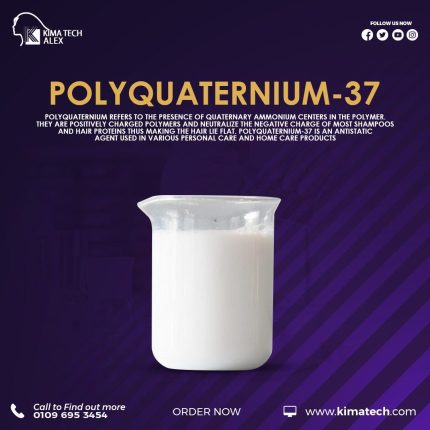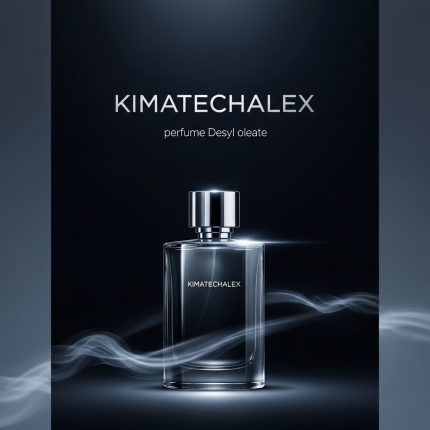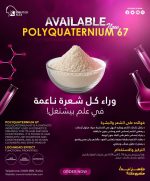

PQ-67 Polyquaternium 67
400 EGP – 8.000 EGPPrice range: 400 EGP through 8.000 EGP
Polyquaternium-67
Polyquaternium-67 (PQ-67) is a high-performance, conditioning polymer used in hair care products. It is derived from renewable sources like wood and cotton. PQ-67 works by depositing onto the hair to provide excellent conditioning, a smooth feel, and enhanced shine.
Technical profile
- Appearance: Typically a white to off-white powder or granules.
- Viscosity: A 1% solution typically has a viscosity of around 2700 centipoise (cP).
- Solubility: Readily soluble in water, where it can form clear, viscous solutions. It is insoluble in oils and most organic solvents.
- Structure: A quaternized hydroxyethyl cellulose (HEC) polymer. The addition of cationic substitutions and hydrophobic modifications enhances its conditioning and deposition capabilities.
Structure and chemical modifications
- HEC backbone: The polymer is derived from the natural, renewable cellulose backbone of hydroxyethyl cellulose (HEC). HEC itself is a water-soluble, non-ionic polymer.
- Quaternization: The HEC backbone is quaternized to introduce cationic sites (positively charged molecules). In PQ-67, these cationic substitutions are trimethyl ammonium groups. The positive charge allows the polymer to deposit effectively onto negatively charged surfaces, such as hair
- Hydrophobic modification: The polymer is further modified with low to medium levels of hydrophobic (water-repelling) groups, specifically dimethyldodecyl ammonium. This modification enhances conditioning properties and promotes the deposition of other beneficial ingredients.
Functional chemical properties
The specific modifications give the polymer its enhanced performance characteristics:
- Enhanced deposition: The combination of cationic and hydrophobic groups allows PQ-67 to more effectively form complexes with surfactants, a process known as the “Lochhead effect.” These gel-like coacervates phase-separate and deposit more efficiently onto hair during washing and rinsing.
- Superior conditioning: The hydrophobic modifications deliver superior conditioning performance, leaving hair feeling soft, smooth, and more manageable.
- Improved ingredient delivery: High-charge-density PQ-67 polymers are especially effective at delivering active ingredients, such as silicones and anti-dandruff additives, from shampoo formulations.
- Excellent compatibility: Like its analog Polyquaternium-10, PQ-67 can be used in clear shampoo formulations without causing haze.
- Versatility: It can be used in formulations with and without silicones and remains an efficient conditioning agent in different surfactant systems.
The statement provided accurately describes the “Lochhead effect” as it relates to Polyquaternium-67 (PQ-67) and other cationic conditioning polymers.
The Lochhead effect is the process where cationic polymers, like PQ-67, interact with anionic surfactants in a diluted solution (such as during the rinsing phase of shampooing) to form gel-like, water-insoluble complexes called coacervates.
How the Lochhead Effect Works:
- Complex Formation: The positive charges on the cationic polymer and the negative charges of the anionic surfactants are attracted to each other, forming a complex.
- Phase Separation: When the shampoo is diluted with water, this polymer-surfactant complex becomes insoluble and phase-separates from the liquid, forming a coacervate.
- Deposition: This coacervate is what deposits onto the negatively charged surface of the hair, delivering conditioning benefits. The coacervates can also trap and co-deposit other beneficial ingredients, such as silicones or fragrances, onto the hair.
The hydrophobic modifications in PQ-67 are key to its enhanced performance, allowing it to form these coacervates more effectively and providing superior conditioning compared to traditional cationic polymers
Functional properties
The specific modifications give the polymer its enhanced performance characteristics:
- Enhanced deposition: The combination of cationic and hydrophobic groups allows PQ-67 to more effectively form complexes with surfactants, a process known as the “Lochhead effect.” These gel-like coacervates phase-separate and deposit more efficiently onto hair during washing and rinsing.
- Superior conditioning: The hydrophobic modifications deliver superior conditioning performance, leaving hair feeling soft, smooth, and more manageable.
- Improved ingredient delivery: High-charge-density PQ-67 polymers are especially effective at delivering active ingredients, such as silicones and anti-dandruff additives, from shampoo formulations.
- Excellent compatibility: Like its analog Polyquaternium-10, PQ-67 can be used in clear shampoo and body wash formulations without causing haze.
- Versatility: It can be used in formulations with and without silicones and remains an efficient conditioning agent in different surfactant systems.
Key benefits
- Superior conditioning: Provides exceptional softness, smoothness, and manageability to hair without causing build-up or weighing it down.
- Enhanced deposition: Efficiently delivers active ingredients like silicones, fragrances, and moisturizers onto hair and skin, even in rinse-off products.
- Formulation clarity: Creates transparent formulations, a key advantage for clear shampoos and body washes.
- Compatible: Works well with a wide range of surfactants, including anionic, nonionic, and amphoteric types.
- Controls frizz: Offers strong conditioning properties, making it particularly effective for extremely curly and frizzy hair.
Applications
- Hair care: Used in a wide variety of hair products, including:
- Shampoos (with and without silicones)
- Conditioners
- Leave-in treatments
- Hair masks
- POLYQUATERNIUM-67 technical profile
| Property | Values |
| Appearance | Powder or granules, white to off-white |
| Nitrogen | 0.97 %wt |
| Solubility | Soluble in water |
| Viscosity | 2724 cPs (1% solution) |
Usage percentages
The concentration of PQ-67 varies depending on the product type:
- Clear shampoos: 0.2% to 0.5% (typically 0.3%)
- Two-in-one shampoos: 0.20% to 0.25%
- Leave-in products and masks: Approximately 0.10%
How to use
To ensure proper incorporation into a formulation, PQ-67 must be properly hydrated in the water phase before other ingredients like surfactants are added. This prevents the polymer from clumping and ensures a smooth, clear final product.
Solubility features
- Water solubility: The polymer has a cellulosic backbone with cationic groups, which gives it a high affinity for water. The polymer must be properly hydrated in the water phase of a formulation before adding surfactants to prevent the formation of “fisheyes” (undissolved clumps).
- Viscosity: When dissolved in water, Polyquaternium-67 produces a viscous solution. The viscosity of this solution increases with concentration.
- Formulation clarity: A major advantage of many Polyquaternium-67 products, such as Dow’s SoftCAT™ polymers, is their ability to dissolve into clear formulations. This allows for the creation of transparent hair and skin cleansing products.
- Formation of coacervates: A unique feature of Polyquaternium-67 is its ability to form beneficial coacervates (liquid-rich phases) when diluted. This process enhances the deposition of beneficial ingredients like silicones and fragrances onto hair and skin, a crucial function for conditioners and body washes.
بوليكواترنيوم-67 (PQ-67)
بوليكواترنيوم-67 هو بوليمر كاتيوني عالي الأداء يُستخدم بشكل أساسي في منتجات العناية بالشعر مثل الشامبو، البلسم، وماسكات الشعر. يتم استخراجه من مصادر طبيعية ومتجددة مثل الخشب والقطن، مما يجعله صديقًا للبيئة.
يتميز PQ-67 بكونه “بوليمر للتكييف” (Conditioning Polymer)، حيث يلتصق على الشعر ليشكل طبقة رقيقة توفر له نعومة ولمعانًا طبيعيًا. كما يعمل على تسهيل تمشيط الشعر والتقليل من التشابك.
الخصائص الفنية
- الشكل:بودر ابيض مائل للاصفرار.
- اللزوجة: محلول بتركيز 1% يصل إلى حوالي 2700 سنتي بواز.
- الذوبان: يذوب بسهولة في الماء ولكن لا يذوب في الزيوت أو المذيبات العضوية.
- التركيب: البوليمر يعتمد على هيدروكسي إيثيل سليلوز (HEC)، وهو بوليمر طبيعي غير أيوني. يتم تعديله كاتيونيًا (موجب الشحنة) لتحسين ترسيبه على الشعر، مع إضافة تعديلات هيدروفوبية (كارهة للماء) لتعزيز الترطيب والملمس الناعم.
التركيب الكيميائي
الهيكل الأساسي للبوليمر هو HEC، ويتم تعديله عبر إضافة مجموعات كاتيونية مثل ثلاثي ميثيل الأمونيوم، مما يجعله يتفاعل مع الشحنات السالبة الموجودة على سطح الشعرة. هذه التعديلات تقلل من الشحنة السالبة للشعر، مما يؤدي إلى تقليل التشابك والتطاير. كما يُضاف تعديلات هيدروفوبية مثل ثنائي ميثيل دوديسيل الأمونيوم، التي تعزز نعومة الشعر وتساعد في جذب المواد الفعالة مثل السليكونات والعطور.
الخصائص الكيميائية والوظيفية
من أبرز المميزات التي يقدمها PQ-67:
-
تحسين الالتصاق (Enhanced adhesion):
عند تفاعل البوليمر مع المادة الخافضة للتوتر السطحي )الأنيونيك( surfactants في الشامبو، يتكون مركب هلامي يُسمى كوسيرفيتس (coacervates)، الذي يلتصق بالشعر ويشكل طبقة تحفظ المكونات المفيدة مثل السليكونات والعطور. هذه العملية تُعرف بتأثير لوكهيد (Lochhead Effect)، حيث تنجذب الشحنات الموجبة من PQ-67 إلى الشحنات السالبة للسرفاكتنت، مما يسبب تكوين مركب جل يتراكم على الشعر ويحتفظ بالمكونات النشطة.
-
ترطيب وملمس فائق (Superior conditioning):
يُحسن PQ-67 من نعومة الشعر، ويجعل تمشيطه أسهل ويقلل من تطايره.
-
تحسين توصيل المكونات (Improved delivery):
يُسهم البوليمر في تعزيز توصيل المكونات الفعالة مثل السليكونات ومضادات القشرة والمرطبات والفيتامينات في الشامبو.
-
توافق عالي (Excellent compatibility):
يمكن استخدامه في الشامبوهات الشفافة دون التأثير على اللون، وهو مناسب لمجموعة واسعة من أنواع السرفاكتنت (anionic، non-ionic،amphoteric.)
-
مرونة في الاستخدام (Versatility):
يُمكن إدخاله في التركيبات التي تحتوي على السليكون أو بدونها، وهو فعال في أي نظام تنظيف.
نسب الاستخدام
- الشامبو الشفاف 0.2% – 0.5% :
- شامبو 2 *1 : 0.2% – 0.25%
- الماسكات والليف إن (Leave-in): حوالي 0.1%
- ⚠️ ملاحظة هامة: يجب إضافة البوليمر في المرحلة المائية قبل السرفاكتنت والتقليب الجيد حتي تمام الذوبان لتجنب التكتلات المعروفة باسم “fisheyes”.
الوظائف التجميلية للبوليمر
- مضاد للتراكم الكهربي (Antistatic): يقلل من الشحنات الساكنة في الشعر.
- تشكيل طبقة رقيقة (Film forming): يشكل طبقة خفيفة على الشعر
- تحسين تكييف الشعر (Hair conditioning): يعزز من نعومة الشعر، اللمعان، ويسهل التمشيط.
كيف يعمل تأثير لوكهيد (Lochhead Effect):
-
تكوين المركب (Complex Formation):
- عندما يتفاعل البوليمر الكاتيوني (موجب الشحنة) مع السرفاكتنت الأنيوني (سالب الشحنة) في الشامبو، فإن الشحنات المتعاكسة تجذب بعضها البعض، مما يؤدي إلى تشكيل مركب بينهما. هذا المركب يتكون نتيجة التفاعل بين الشحنات المختلفة للبوليمر والسرفاكتنت.
-
فصل الأطوار (Phase Separation):
- عندما يتم تخفيف الشامبو بالماء، يصبح المركب الذي تم تكوينه بين البوليمر والسرفاكتنت غير قابل للذوبان في الماء. نتيجة لذلك، ينفصل المركب عن السائل في عملية تُسمى فصل الأطوار (Phase Separation)، حيث يتكون مركب جيلاتيني يُسمى كوسيرفيتس (Coacervate).
-
الترسيب (Deposition):
- هذا المركب الجيلاتيني (الكوسيرفيتس) يترسب على الأسطح السالبة الشحنة، مثل الشعر. عند التفاعل مع الشعر، يساهم الكوسيرفيتس في تحسين خواص التكييف، حيث يُساعد على تلطيف الشعر وجعله أكثر نعومة ولمعانًا. بالإضافة إلى ذلك، يمكن للكوسيرفيتس أن يحجز ويترسب مكونات مفيدة أخرى، مثل السليكونات أو العطور، على الشعر، مما يساهم في تعزيز الفوائد التجميلية.
أهمية التعديلات الهيدروفوبية في PQ-67:
- التعديلات الهيدروفوبية (المقاومة للماء) في PQ-67 تلعب دورًا أساسيًا في تعزيز أدائه. هذه التعديلات تتيح للبوليمر تشكيل الكوسيرفيتس بشكل أكثر فعالية مقارنة بالبوليمرات الكاتيونية التقليدية. بفضل هذه التعديلات، يستطيع PQ-67 توفير تحسين فائق في التكييف، مما يجعله أكثر فعالية في تحسين ملمس الشعر مقارنة بالبوليمرات الأخرى.
الخلاصة:
تأثير لوكهيد هو عملية تعتمد على تكوين مركبات جيلاتينية بين البوليمر الكاتيوني والسرفاكتنت الأنيوني. هذه المركبات تُترسب على الشعر أو الجلد لتوفير فوائد تكييفية، مع القدرة على حجز مكونات إضافية مثل السليكونات أو العطور. وتساعد التعديلات الهيدروفوبية في PQ-67 على تحسين هذه العملية بشكل كبير.
| Size |
10 gm ,25 gm ,50 gm ,100 gm ,250 gm ,500 gm ,1000 gm |
|---|
Related products

Decyl oleate Cetiol V

Desyl oleate ديسيل اوليت

PQ-22 Poly Quaternium 22

pq-37 Polyquaternium 37

PQ-7 Poly Quaternium 7

سيتول He PEG-7 Glyceryl Cocoate

كوزموديا جوار Cosmodia Guar




Reviews
There are no reviews yet.